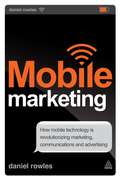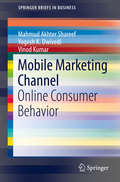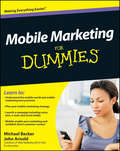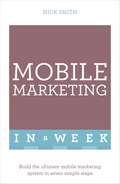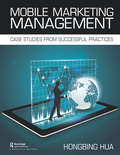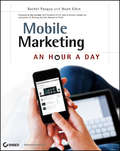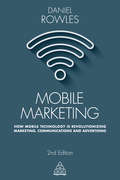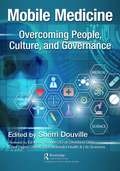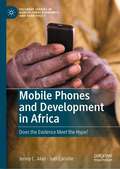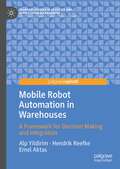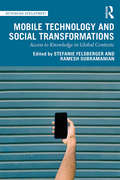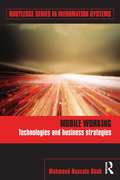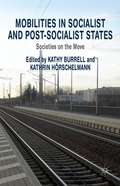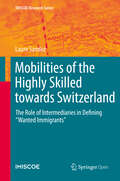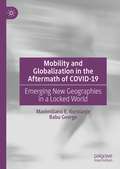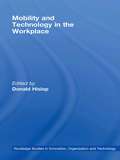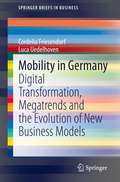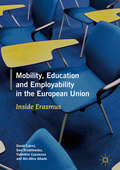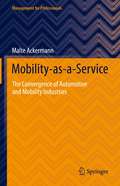- Table View
- List View
Mobile Marketing
by Daniel RowlesHaving become the ultimate social device, and as users drift away from TVs and computer screens, the mobile offers radical new challenges for the marketer. But how do you design and implement an effective digital strategy? And what tools can be used to measure marketing effectiveness?Starting with a review of the technology itself - both hardware and software - Mobile Marketing explains the dynamics between the key players and how these forces are shaping future developments in terms of service provision, media integration and content strategy. Supported by in-depth case studies, which illustrate the potential pitfalls and rewards of mobile marketing initiatives, Mobile Marketing shows how our new mobile lifestyle can be a rewarding environment for those businesses willing to embrace new technology and, with imagination and creativity, develop mobile marketing strategies that can win customers, boost brand awareness, raise profile and increase profits.
Mobile Marketing Channel
by Yogesh K. Dwivedi Mahmud Akhter Shareef Vinod KumarThis book attempts to address, explore, and conceptualize the epistemological paradigms of SMS as an alternative marketing channel or in combination with other existing traditional channels. It promotes a multichannel strategy in the light of synthesized marketing distribution, consumer behavior, and information and communication technology (ICT)-related behavioral theory to develop, establish, and launch a guiding theory and practice for this emerging area. Usage of mobile phones and hand-held wireless devices is growing and diffusing so quickly that 21st century marketing managers find a great potential for this wireless channel to be the most effective media for maintaining a consumer relationship that provides the highest quality service. The emergence of SMS-based direct marketing as a distinct channel or embedded with other channels is characterized by several issues, challenges, barriers, and limitations. This book examines and postulates the following interrelated issues related to wireless marketing (particularly the SMS-based marketing channel): (i) Consumer behavior for mobile phone SMS - perception, exposure, and attention; (ii) Consumer attitudes toward SMS-based marketing channels; (iii) The scope of SMS to meet consumer service output demands from an online channel; (iv) Consumer selection criteria for mobile phone SMS channel structure; (v) Mobile channel structure as an efficient and effective consumer interaction mode; and (vi) Consumer multichannel behavior. It is important to use the SMS-based mobile channel as a radical tool of interactive marketing and seamless service marketing, as there is the opportunity to maximize, u ntil now, unutilized benefits of this efficient and popular direct marketing channel.
Mobile Marketing For Dummies
by John Arnold Michael BeckerStraightforward advice on building and launching a mobile marketing plan Mobile communication is hot, and so is marketing on mobile devices. Mobile Marketing For Dummies provides a clear and easy path for creating, launching, and making the most of a mobile marketing program. Designed for marketing professionals and other business people who may have little experience with the medium, it explains mobile marketing and how to convert a traditional marketing plan to mobile. Topics include assembling resources and budget, creating a plan, following best practices, building mobile sites, and much more. Explains what mobile marketing is, how you can adapt a traditional marketing plan for mobile, and how to create and launch a mobile marketing plan from scratch Covers activating a plan using voice, text, e-mail, and social media campaigns Explores the nuts and bolts of building mobile sites, apps, monetizing mobile, and advertising on other mobile properties Mobile Marketing For Dummies gives you the tools to succeed in this exciting environment.
Mobile Marketing In A Week: Build The Ultimate Mobile Marketing System In Seven Simple Steps
by Nick SmithUnderstand mobile marketing fast, without cutting cornersAn understanding of mobile marketing is essential for anyone who wants to reach the growing market of on-the-go consumers. In this short, accessible book, Nick Smith shares a lifetime of hard-earned wisdom and practical advice, giving you, in straightforward language, all the mobile marketing expertise you need to run successful mobile campaigns. The 'in a week' structure explains the essentials of mobile marketing over just 7 days:Sunday: Why the future is mobileMonday: Basic mobile traffic getting tacticsTuesday: Social mobile marketingWednesday: Mobile pay per click (PPC) marketingThursday: Mobile apps for SMEsFriday: SMS marketingSaturday: Building the ultimate mobile marketing systemAt the end there are questions to ensure you have taken it all in and cartoons, diagrams and visual aids throughout help make Mobile Marketing In A Week an enjoyable and effective learning experience.So what are you waiting for? Take the fast track to successful mobile marketing!
Mobile Marketing Management: Case Studies from Successful Practices
by Hongbing HuaWith the development of mobile internet technology, people’s lifestyle and consumer behavior are changing rapidly. Nowadays, the products on the market are updating more and more frequently, and the traditional marketing theory and brand theory fail to get with the mobile internet. So, what’s the innovative marketing to take in the new era? Since 2012, China has entered into the mobile era, and became a major country of mobile internet application. The book summarizes the experience of the author accumulated from many trials and errors in management and marketing innovation, so as to form the pattern of management and marketing for the next 30 years. Mobile Marketing Management lays the foundation for the new era with four pillars: service, substance, superuser, space, known as 4S theory for short. In view of the concept of customer-first, it is all about service, and products become productized service concepts. In view of the failure of mass communication, the competition among all services becomes the competition of substance differentiation. Regarding the popularity of self-organization, it becomes a trend to cooperate with people rather than the company to develop the market. In view of the principle of fuzzy market boundary, the enterprises shall optimize their living space and evolve their development space. This book contains numerous case studies along with analysis and creates the discipline of mobile marketing management, providing innovative theories, methods and tools for the marketing of enterprises. Through this book, readers can master the marketing methods of the mobile internet era. They can apply the marketing theory in this book to guide the marketing practice, thus improving marketing efficiency and reducing marketing costs.
Mobile Marketing: An Hour a Day
by Rachel Pasqua Noah ElkinA step-by-step guide to successful mobile marketing strategies Go from zero to sixty with this practical book that helps you craft and deploy mobile marketing strategies for everything from brand building to lead generation and sales. As part of the popular do-it-yourself, Hour A Day series, this new book is full of advice, practical tips, and step-by-step tactics you can put to use right away. Start leveraging location-based marketing via Foursquare and Yelp, see how to set up and manage mobile commerce, and try such technologies as QR codes, ambient communication (RFID and Bluetooth), mobile broadcasting, and more. Take action now and mobile-loving customers will soon find you, thanks to these successful ideas and strategies from expert mobile marketers, Rachel Pasqua and Noah Elkin. Shows you step by step how to develop, implement, and measure a successful mobile marketing strategy Pares down a complex process into approachable, bite-sized tasks you can tackle in an hour a day Covers vital mobile marketing weapons like messaging, mobile websites, apps, and mobile advertising to help you achieve your goals Gets you up to speed on location-based marketing via Foursquare and Yelp, using mobile commerce, and leveraging technologies such as as QR codes, ambient communication (RFID and Bluetooth), and mobile broadcasting Mobile Marketing: An Hour A Day is a must-have resource for marketers and advertisers who want a compelling mobile presence.
Mobile Marketing: How Mobile Technology is Revolutionizing Marketing, Communications and Advertising
by Daniel RowlesMobile Marketing is a clear, practical guide to harnessing the mobile consumer and tackling the rising challenges of divided user attention across multiple screens at the same time. It demystifies the vast spectrum of tools and techniques now available and explains how to optimize these dynamics into an innovative and effective mobile marketing strategy. Now that website search rankings take into account mobile optimization, no serious marketer can do without a thorough understanding of mobile.The first edition of Mobile Marketing won the Judge's Choice Award in Social Media at the Small Business Trend's 2014 Book Awards. This fully revised 2nd edition includes straightforward explanations on mobile optimized content, app development, social media and proximity based marketing. It has also expanded to include two brand new chapters on mobile and email and on location-based devices, plus cutting-edge updates on advances in wearable technology, mobile payments, virtual reality and strategies for the changing user journey. Integrated with tactical checklists, easy application frameworks and powerful case study insights such as Heineken, WordPress, MailChimp, Nike Training Club (NTC), Google Play and Moz, if provides a full overview from service provision and technology integration to content strategy, ready to capture fast-moving consumers on the go.
Mobile Medicine: Overcoming People, Culture, and Governance
by Sherri Douville"The healthcare industry is undergoing a transformation of exponential change and opportunity that bears daunting challenges. To incorporate groundbreaking technologies, we as leaders are building our people, skills, cultures, and leadership to capitalize on and refine those technologies to address the urgent needs of today and tomorrow. This timely work is written by a world-class multi-disciplinary team in Healthcare IT, medicine, and business. This breadth and collaboration is what's required to deliver this very timely cross-functional discussion and fantastic action planning resource. This book is required reading for any organization looking to lead the next wave of healthcare technology to improve care quality, patient safety, and clinician satisfaction to help us save more lives and keep people healthy across the entire care continuum." Aaron Miri Chief Information Officer for Dell Medical School and UT Health Austin & Co-Chair for the U.S. Department of Health and Human Services’ Federal Health IT Advisory Committee An actionable and practical resource to accelerate mobile computing in medicine: No topic in healthcare technology is more urgent and yet more elusive to date than mobile computing in medicine. It adheres to no boundaries, stagnates in silos, and demands not just the attention of dedicated professionals, but also teams of teams. A rich resource, this book shares hard-won lessons and primary research for better understanding, management, and execution of key mobile computing initiatives in medicine (that can save patient lives by reducing delays in medical information). It provides an action planning reference guide for mobile medicine stakeholders, including health system and insurance decision makers, clinicians, and investors. Foundational and groundbreaking in its knowledge set and combination, it also provides a unique and rare perspective, drawing from 27 distinct experts across disciplines from legal to medicine, informatics, organizational psychology, cybersecurity to engineering – the building blocks needed to catalyze a comprehensive mobile medicine strategy for your health system or investment thesis. Considering we lose a family member, colleague, or someone else every nine minutes due to a delay in medical information according to the Institute for Healthcare Improvement, this book makes significant strides in efficiently conveying foundational knowledge that can contribute to implementing mobile computing safely and cost-effectively while improving clinician and patient experiences in healthcare. These insights will accelerate the reader’s ability to conceptualize the real opportunities via mobile computing in medicine. FEATURES: Provides a current understanding of why the adoption of mobile medicine has been meager to date and what gaps and opportunities exist Delivers proven management and leadership techniques from experts doing the work of building IT, security, and informatics organizations and workflows in preparing for mobile medicine Describes how to navigate cultures of related professions essential to mobile medicine, including insights from physicians, engineers, informaticists, lawyers, IT researchers, organizational psychologists, board directors, researchers, cybersecurity leaders, and other key stakeholders Demystifies the latest, up-to-date federal rules, laws, and regulations impacting and enabling the promise of mobile medicine Highlights how to best mitigate risks for the development and deployment of mobile medicine and next-generation innovations, such as wearable robotics into the clinical environment Offers resources and tools to enable unprecedented collaboration across diverse professionals including, but not limited to, functional and work differences as well as skillsets and other factors of talent diversity required to bring mo
Mobile Phones and Development in Africa: Does the Evidence Meet the Hype? (Palgrave Studies in Agricultural Economics and Food Policy)
by Jenny C. Aker Joël CariolleThis book focuses on the impact of information technology on the lives and livelihoods of rural households in sub-Saharan Africa, where simple mobile phones have leapfrogged traditional communication and financial technologies, and thus, arguably, offer some of the greatest potential for development. Drawing on primary and secondary research from a variety of disciplines, the authors examine the evolution of mobile phone coverage and adoption in sub-Saharan Africa over the past two decades, before exploring the main channels through which mobile phones can affect development. They then review initiatives on “digitizing development” and evaluate empirical evidence on their impact. The book argues that digital has yet to live up to the hype, ending with a set of questions that stakeholders should ask (and answer) when using digital technology for promoting development.
Mobile Robot Automation in Warehouses: A Framework for Decision Making and Integration (Palgrave Studies in Logistics and Supply Chain Management)
by Emel Aktas Hendrik Reefke Alp YildirimThis book illustrates the applications of mobile robot systems in warehouse operations with an integrated decision framework for their selection and application. Mobile robot systems are an automation solution in warehouses that make order fulfillment agile, flexible and scalable to cope with the increasing volume and complexity of customer orders. Compared with manual operations, they combine higher productivity and throughput with lower operating costs. As the practical use of mobile robot systems is increasing, decision-makers are confronted with a plethora of decisions. Still, research is lagging in providing the needed academic insights and managerial guidance. The lack of a structured decision framework tailored for mobile robot system applications in warehouses increases the probability of problems when choosing automation systems. This book demonstrates the characteristics of mobile robot systems which reinforce warehouse managers in identifying, evaluating and choosing candidate systems through multiple criteria. Furthermore, the managerial decision framework covering decisions at strategic, tactical and operational levels in detail helps decision-makers to implement a mobile robot solution step-by-step. This book puts special emphasis on change management and operational control of mobile robots using path planning and task allocation algorithms. The book also introduces focus areas that require particular attention to aid the efficiency and practical application of these systems, such as facility layout planning, robot fleet sizing, and human-robot interaction. It will be essential reading for academics and students working on digital warehousing and logistics, as well as practitioners in warehouses looking to make informed decisions.
Mobile Technology and Social Transformations: Access to Knowledge in Global Contexts (Rethinking Development)
by Stefanie FelsbergerThis book investigates the ways in which the mobile telephone has transformed societies around the world, bringing both opportunities and challenges. At a time when knowledge and truth are increasingly contested, the book asks how mobile technology has changed the ways in which people create, disseminate, and access knowledge. Worldwide, mobile internet access has surpassed desktop access, and it is estimated that by 2022 there will be AN excess of 6 billion mobile phone users in the world. This widespread proliferation raises all sorts of questions around who creates knowledge, how is that knowledge shared and proliferated, and what are the structural political, economic, and legal conditions in which knowledge is accessed. The practices and power dynamics around mobile technologies are location specific. They look different depending on whether one chooses to highlight the legal, social, political, or economic context. Bringing together scholars, journalists, activists and practitioners from around the world, this book embraces this complexity, providing a multifaceted picture that acknowledges the tensions and contradictions surrounding accessing knowledge through mobile technologies. With case studies from Hong Kong, South Korea, India, Syria, Egypt, Botswana, Brazil, and the US, this book provides an important account of the changing nature of our access to knowledge, and is key reading for students, researchers, activists and policy makers with an interest in technology and access to knowledge, communication, social transformation, and global development.
Mobile Working: Technologies and Business Strategies (Routledge Series in Information Systems)
by Mahmood Hussain ShahImprovements in information and communication technologies (ICTs) have brought about a sea change in the ways in which most people in the industrialized world work. In many organizations the ability to "work remotely" or "telecommute" has helped productivity improve. However, many of the benefits promised by the onset of "mobile working" have failed to materialize. This book explains the technology and strategic issues surrounding mobile working and presents a clear analysis of how this process can be managed. Combining a better understanding of the state of the art in e-business technologies with a focus on how organizations can effectively provide information support for mobile working, this book will also investigate the relationship between human and organizational factors and success in mobile working. With detailed case studies from a range of countries, this book will be useful reading on a range of courses at Masters and MBA level, including e-business, mobile technologies, operations management, technology management and change management.
Mobileye 2021: Robotaxi and/or Consumer AV?
by David B. Yoffie Nicole Tempest Keller Danielle GolanShashua's challenge was that consumer AVs were still years away due to concerns over safety, regulation, cost, and consumer acceptance. A nearer term use case for AVs was the robotaxi market - fully autonomous, driverless taxis. Shashua and his team were excited about the potential of robotaxis to change the future of mobility, projecting that the market would grow to $160 billion globally by 2030. Mobileye believed that it could generate at least $15 billion in annual robotaxi revenue by the end of the decade. Equally important, Shashua viewed robotaxis as a necessary first step toward consumer AVs. Mobileye could use its experience in robotaxis to improve AV technology, address regulatory challenges, and build high definition maps. The long-term question facing Mobileye was whether to: 1) invest billions of dollars to build-out a global, vertically integrated robotaxi business; 2) use robotaxis as an opportunity learn and then revert back to a horizontal supplier of AV chips and software; and/or 3) do both? During most of Intel's history, the company had been a horizontal semiconductor company which avoided vertically integrating into its customers' businesses. Should Shashua make the case that it was time for a change - and Intel should run a full-stack vertical robotaxi company? Each strategic choice had different capital requirements, risk profiles, and margin opportunities. Shashua needed to decide which direction to recommend to Gelsinger.
Mobileye Update, 2019
by David B. Yoffie Daniel FisherMobileye was an Israeli company, officially headquartered in The Netherlands, which was a Tier 2 supplier to the global automobile industry. This short case updates Mobileye's business performance and strategy, following the acquisition by Intel in 2017.
Mobileye: The Future of Driverless Cars
by David B. YoffieMobileye was an Israeli company, officially headquartered in The Netherlands, which was a Tier 2 supplier to the global automobile industry. After 15 years of building a leading technology for autonomous driving systems, Mobileye emerged in 2014 as one of the most exciting companies in the race for the driverless car. After going public in August 2014, which made its founders-Amnon Shashua and Ziv Aviram-billionaires, the company looked set to become the de facto standard for vision-based autonomous and ultimately self-driving cars. This case explores the company's competitive position, the challenges of sustaining its advantages in a highly competitive industry, and how it should work with Google, the publicly perceived leader in the self-driving revolution.
Mobileye: The Future of Driverless Cars
by David B. YoffieMobileye was an Israeli company, officially headquartered in The Netherlands, which was a Tier 2 supplier to the global automobile industry. After 15 years of building a leading technology for autonomous driving systems, Mobileye emerged in 2014 as one of the most exciting companies in the race for the driverless car. After going public in August 2014, which made its founders-Amnon Shashua and Ziv Aviram-billionaires, the company looked set to become the de facto standard for vision-based autonomous and ultimately self-driving cars. This case explores the company's competitive position, the challenges of sustaining its advantages in a highly competitive industry, and how it should work with Google, the publicly perceived leader in the self-driving revolution.
Mobilities and Neighbourhood Belonging in Cities and Suburbs
by Paul Watt Peer SmetsContemporary urban and suburban dwellers seem to be constantly on the move - commuting to work and travelling for leisure as well as moving homes. Does this mean that people are rootless and lack a sense of belonging to particular places, and especially to the neighbourhoods in which they live? Or does enhanced mobility co-exist with feelings of community, belonging and being-at-home? These questions are examined in the chapters of this collection through an exciting series of neighbourhood-based case studies drawn from original research undertaken in the cities and suburbs of Europe, North America and Africa. This book discusses various forms of place belonging, gated communities, social mixing in post-regeneration neighbourhoods, transnational and forced mobility, suburban youth, and everyday social relations between 'newcomers' and 'old timers'. The chapters illustrate how neighbourhoods are made and remade through flows of people as they circulate in and out, within and around these residential locales via everyday travel and periodic residential relocation. This inter-disciplinary collection employs a range of theoretical approaches drawn from urban studies, sociology, social anthropology, geography and planning.
Mobilities in Socialist and Post-Socialist States
by Kathy Burrell Kathrin HörschelmannThis edited collection explores what mobility meant, and means, in the specific contexts of socialist and post-socialist Soviet and East European societies. Under the socialist regimes, mobility was at the heart of everyday interactions with the state, from controls on travel and communications mobilities to daily experiences of transport usage and the immobility of queuing for goods at times of shortages. These mobilities have been reshaped under post-socialist regimes. While the collapse of socialism heralded a liberalization of international migration and increased automobility, new experiences of poverty, unemployment, and in the case of some states, war, plus the loss of subsidized travel greatly reduced fields of mobility. Bringing together contributors from the dynamic fields of Mobilities and Socialist/Post-Socialist Studies this book uses the focus on socialist and post-socialist mobilities to investigate fundamental intersections of power, control, resistance and inequality.
Mobilities of the Highly Skilled towards Switzerland: The Role of Intermediaries in Defining “Wanted Immigrants” (IMISCOE Research Series)
by Laure SandozThis open access book analyses the strategies of migration intermediaries from the public and private sectors in Switzerland to select, attract, and retain highly skilled migrants who represent value to them. It reveals how state and economic actors define “wanted immigrants” and provide them with privileged access to the Swiss territory and labour market. The analysis draws on an ethnographic study conducted in the French-speaking Lake Geneva area and the German-speaking northwestern region of Switzerland between 2014 and 2018. It shows how institutional actors influence which resources are available to different groups of newcomers by defining and dividing migrants according to constructed social categories that correlate with specific status and privileges. This research thus shifts the focus from an approach that takes the category of highly skilled migrant for granted to one that regards context as crucial for structuring migrants’ characteristics, trajectories, and experiences. Beyond consideration of professional qualifications, the ways decision-makers perceive candidates and shape their resource environments are crucial for constructing them as skilled or unskilled, wanted or unwanted, welcome or unwelcome.
Mobility and Globalization in the Aftermath of COVID-19: Emerging New Geographies in a Locked World
by Maximiliano E. Korstanje Babu GeorgeThis book argues that COVID-19 revives a much deeper climate of terror which was instilled by terrorism and the War on Terror originally declared by Bush's administration in 2001. It discusses critically not only the consequences of COVID-19 on our daily lives but also “the end of hospitality”, at least as we know it.Since COVID-19 started spreading across the globe, it affected not only the tourism industry but also ground global trade to a halt. Governments adopted restrictive measures to stop the spread of the virus, including the closure of borders, and airspace, the introduction of strict lockdowns and social distancing, much of which led to large-scale cancellations of international and domestic flights. This book explores how global tourists, who were largely considered ambassadors of democratic and prosperous societies in the pre-pandemic days, have suddenly become undesired guests.
Mobility and Technology in the Workplace
by Donald HislopThe contemporary period has witnessed the rapid evolution in a wide range of mobile technology. This book charts the profound implications these technological changes have for workers and business organizations. From an organizational point of view they have the potential to transform the nature of organizations, through allowing workers to be incr
Mobility in Germany: Digital Transformation, Megatrends and the Evolution of New Business Models (SpringerBriefs in Business)
by Cordelia Friesendorf Luca UedelhovenMobility in Germany is embracing market changes like never before. Megatrends, notably, digitalization, urbanization and sustainable thinking are driving Germany’s mobility transformation such that traditional players are rethinking their business models and new companies are constantly seeking market penetration. This book captures these changes in a holistic approach to depict Germany’s mobility transition driven by innovation. Beginning with an evaluation of the market environment and megatrends impacting mobility, the book compares and contrasts traditional mobility business models with those of the new entrants. Using business management techniques and a detailed survey on customer perspectives, this book equips mobility professionals, policymakers, entrepreneurs and researchers with concise, critical and up-to-date analysis of the developments in German mobility and provides valuable insights into new business models that offer user-oriented, futuristic and sustainable mobility solutions.
Mobility of Health Professionals
by Wissenschaftliches Institut Der Frits Tjadens Josef Eckert Caren WeilandtThis book on mobility of health professionals reviews, analyses and summarises published information and data as well as collected interview data from stake holders, including politicians, policy makers, health service managers and migrant health workers. It is based on the research carried out under the umbrella of the EU-funded project "Mobility of Health Professionals (MoHProf). The partners involved in the MoHProf project gathered evidence from 25 countries around basic questions and knowledge gaps relating to the international migration of health professionals, which involved an analysis of migration flows and evaluation of policies addressing migration. This book provides a comprehensive description and analysis of the mobility streams, the motives and driving forces behind them and the impact on and challenges for health systems and draws conclusions and provides recommendations for future strategic planning, monitoring and the management of mobility of health professionals as well as further research and policy development needs.
Mobility, Education and Employability in the European Union: Inside Erasmus
by David Cairns Valentina Cuzzocrea Ewa Krzaklewska Airi-Alina AllasteThis book takes an in-depth look at the European Commission’s Erasmus programme. In its current Erasmus+ format, the programme supports international exchange visits among students, trainees, volunteers and academic members of staff with a view to enhancing employability and encouraging intercultural understanding. Against the backdrop of the 30th anniversary of Erasmus, the authors explore the successes of the programme, most prominently the undergraduate exchange programme, as well as areas of on-going development, including the incorporation of short duration mobility projects focused on specific social issues into the initiative.Through integrating perspectives from authors in a number of European countries, all of whom have knowledge regarding various aspects of Erasmus, the book provides insight into the challenges facing the programme as it moves into its fourth decade. Mobility, Education and Employability in the European Union: Inside Erasmus will be of interest to students and scholars from a range of disciplines, including geography, sociology and European politics.
Mobility-as-a-Service: The Convergence of Automotive and Mobility Industries (Management for Professionals)
by Malte AckermannThe advent of mobility-as-a-service and the disruption of the automotive industry are both overlapping and fuelled by the same developments and thus raise a very fundamental question: are we at peak car? Based on the author’s extensive field research, academic study, and professional experience, this book explores this very question as well as the underlying social, economic, generational, and regulatory changes that lead to a new mobility regime. Through rich descriptions of established OEMs and mobility start-ups, it discusses the current forms of mobility and the promise of autonomous technology. It further explores the strategic dimension of these developments so as to navigate and succeed within the disruptive and ever-changing environment of mobility services.
